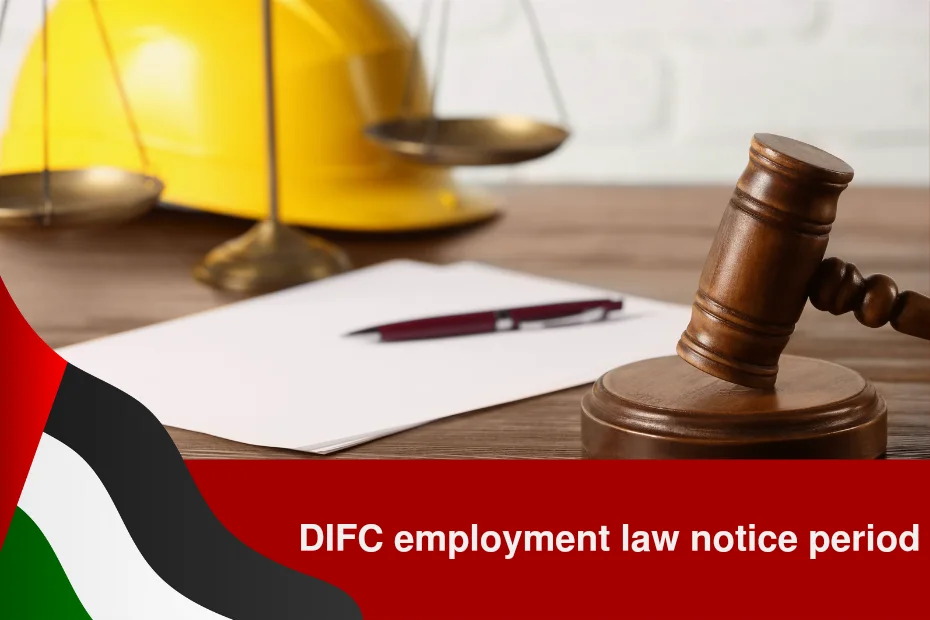This article provides a detailed overview of the DIFC employment law notice period and offers vital information on lawful termination, compliance with the law, and related legal services.
Contact Al Mulla Labor Lawyer in Dubai. Click the WhatsApp icon below or go to the Contact Us page. Locations: Dubai, Abu Dhabi and Ras Al Khaimah.
Table of Contents
DIFC Employment Law Notice Period Rules
Either the employer or the employee must give written notice to terminate an employee’s employment.
According to Article 62(2) of DIFC employment law No. 2 of 2019, the notice period should not be less than the following:
- If the employee has worked continuously for less than three months, including any period of secondment, the notice period should be seven days.
- The notice period should be thirty days if the employee has worked continuously for more than three months but less than five years, including any period of secondment.
- The notice period should be ninety days if the employee has worked continuously for more than five years, including any period of secondment.
According to Article 62(3), an employer and worker can agree to a longer notice period in an employment agreement.
The provision of Article 62(2) does not apply in the following situations:
- During probation periods.
- Where it has been mutually agreed in the employment agreement that the worker’s employment will end on the expiry of a specified term.
- In the case of termination due to excessive sick leave as per the guidelines specified in Article 36(1).
Both parties have specific rights and obligations during the notice period:
- Employer: The employee must provide written notice and is obliged to pay all owed wages and benefits during the notice period.
- Employees are required to work their normal duties unless mutually agreed otherwise. They are entitled to regular compensation.
Serious breaches may lead to summary dismissal without notice. However, this must be for a grave cause, and the process must align strictly with DIFC regulations to avoid legal consequences.
Read more about Minimum notice periods in this PDF file provided by the DIFC website: Employment Law no 2 of 2019, updated 2024.
Legal Services Related to Notice Periods in DIFC Employment Law
Al Mulla Lawyers provides comprehensive legal services tailored to the specific needs of DIFC employers and employees regarding notice periods and other aspects of employment law in 2024. Our services include:
- Legal Advice: Guidance on drafting and reviewing employment contracts to comply with DIFC Employment Law.
- Representation: Representing either party in disputes related to wrongful termination, inadequate notice, or compensation issues.
- Compliance Audits: Ensuring that employment practices adhere to DIFC regulations, minimizing legal risks.
- Negotiation Assistance: Helping negotiate terms of separation or modification of employment terms during the notice period.
FAQs about employment law notice period DIFC
Conclusion about DIFC employment law notice period:
Understanding notice periods under DIFC Employment Law requires a thorough knowledge of legal obligations and rights.
Whether you are an employer or an employee, handling notice periods carefully is crucial to ensure a lawful termination and avoid unnecessary complications.
Consulting with specialized legal services like Al Mulla Lawyers can provide the necessary support and expertise to manage these transitions smoothly and compliantly.
Contact Al Mulla Lawyers today! Click the Whatsapp icon below or visit our Contact Us page.
Find us at these locations:
– Dubai: Deira, Port Saeed, Street 8, City Avenue Building, Office 705-708.
– Abu Dhabi: Corniche Street, Golden Tower, Office 22.
– Ras Al Khaimah: Al Nakheel, Al Maamoura Building (Emirates NBD Bank Building), Fourth Floor.
Read about DIFC employment law gratuity of end of service, DIFC employment law termination, and DIFC employment lawyers services.
A legal consultant specializing in UAE labor law. He regularly publishes articles on the website and writes on various areas of UAE law, with a specific focus on labor law.
